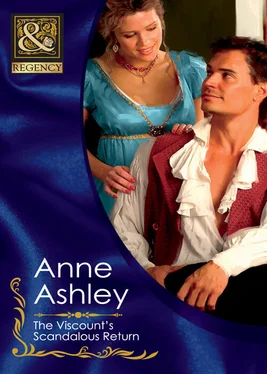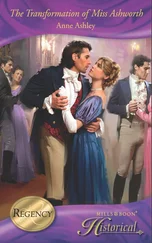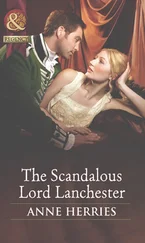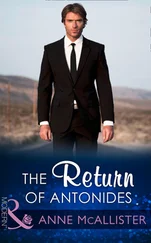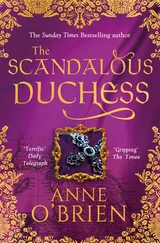ANNE ASHLEY - The Viscount's Scandalous Return
Здесь есть возможность читать онлайн «ANNE ASHLEY - The Viscount's Scandalous Return» — ознакомительный отрывок электронной книги совершенно бесплатно, а после прочтения отрывка купить полную версию. В некоторых случаях можно слушать аудио, скачать через торрент в формате fb2 и присутствует краткое содержание. Жанр: unrecognised, на английском языке. Описание произведения, (предисловие) а так же отзывы посетителей доступны на портале библиотеки ЛибКат.
- Название:The Viscount's Scandalous Return
- Автор:
- Жанр:
- Год:неизвестен
- ISBN:нет данных
- Рейтинг книги:4 / 5. Голосов: 1
-
Избранное:Добавить в избранное
- Отзывы:
-
Ваша оценка:
- 80
- 1
- 2
- 3
- 4
- 5
The Viscount's Scandalous Return: краткое содержание, описание и аннотация
Предлагаем к чтению аннотацию, описание, краткое содержание или предисловие (зависит от того, что написал сам автор книги «The Viscount's Scandalous Return»). Если вы не нашли необходимую информацию о книге — напишите в комментариях, мы постараемся отыскать её.
The Viscount's Scandalous Return — читать онлайн ознакомительный отрывок
Ниже представлен текст книги, разбитый по страницам. Система сохранения места последней прочитанной страницы, позволяет с удобством читать онлайн бесплатно книгу «The Viscount's Scandalous Return», без необходимости каждый раз заново искать на чём Вы остановились. Поставьте закладку, и сможете в любой момент перейти на страницу, на которой закончили чтение.
Интервал:
Закладка:
This touching exchange was witnessed by more than one person, as Isabel quickly discovered, when the butler requested her to take a seat whilst he discovered whether his lordship was available to see her.
‘Don’t trouble yourself, Tredwell. I’m quite at leisure,’ a smooth voice assured him, and Isabel swung round to see the master of the fine Restoration building leaning against a door jamb, his arms folded across his manly chest.
‘This is an unexpected pleasure, Miss Mortimer,’ he declared, after moving to one side in order that she might precede him into the room. He then looked at her intently, studying her from head to toe, and paying particular attention to the wild and shining windswept locks, the glowing colour in her cheeks and her unshod feet, whilst all the time she took stock of her surroundings, in blissful ignorance of his scrutiny.
‘Had I not happened to witness that touching little reunion between you and Josh, I might have been forgiven for imagining some personal calamity had befallen you. I shall take leave to inform you, young woman, you look a positive fright! In fact, little better than any ill-groomed labouring wench!’
‘And so would you, if you’d traipsed across the park in this wind,’ she defended abruptly, clearly nettled by the criticism, though she did whip off the red ribbon that had earlier confined her locks at the nape of her neck and retied it as best she could without the aid of a mirror.
Secretly he had thought she looked stunningly attractive with her rich chestnut locks framing the healthy glow in her face. She was so different from so many of those high-born society ladies who made full use of any artificial aid to beauty. Miss Isabel Mortimer might never be considered by some to be a gem of loveliness, a pearl beyond price. But she was certainly out of the common way, he decided, and quite refreshingly natural.
‘Do sit yourself down, Miss Mortimer, and tell me how I may serve you,’ he invited, while pouring out two glasses of wine. ‘Here, drink it,’ he added, when she attempted to refuse the Madeira. ‘It will calm your nerves.’
‘There’s absolutely nothing wrong with my nerves,’ she assured him, reluctantly accepting the glass. ‘I’m merely damnably annoyed.’
‘About what, may I ask?’ he enquired, not wholly approving the unladylike language, which was strange, considering that he never objected to plain speaking as a rule.
‘For the past six years, my lord, the ditch on the western boundary of your property has repeatedly overflowed on to my land, after any prolonged spells of rain, to the detriment of my vegetable crops. Time and again I approached the last steward, Guy Fensham, to do something about it, but to no avail. Why your family ever employed such a lazy—’ Isabel pulled herself up abruptly, realising suddenly that she was going beyond what was pleasing by voicing opinions on matters that were absolutely none of her concern.
Taking a moment to fortify herself from the contents of her glass, she peered up at him through her lashes. He didn’t seem in the least annoyed by her outburst. But then it was sometimes very difficult to judge what was passing through the mind of this enigmatic aristocrat, she reminded herself. ‘But you do not need me to tell you how he neglected his duties during your time away, sir.’
Without uttering a word, his lordship went over to his desk and proceeded to write a brief note. The silence in the room was punctuated by the scratching of the quill across the sheet of paper, the steady ticking of the mantel-clock and a distant low and eerie howling. Which Isabel did her best to ignore whilst taking further stock of her surroundings.
It really was a very masculine room, with its dark wooden furnishings, and heavy leather-bound tomes lining two of its walls. The claret-coloured curtains at the window matched almost perfectly the shade of the leather upholstery on the heavy chairs. Only the fine painting of the woman and the boy above the fireplace might have been considered by some to be out of keeping with the rest of the room. Yet the more Isabel peered up at the portrait of the striking dark-haired woman, with her arm lovingly placed round the shoulders of a handsome boy, the more she considered it provided a necessary relief to the library’s ambience of rigid masculinity.
As his lordship rejoined her by the hearth, and Isabel watched him reach for the bell-pull, her eyes automatically returned to the portrait above his head. Then stark reality hit her like a physical blow, almost making her gasp.
‘Good Lord! That’s you, sir!’
He raised his eyes briefly to the likeness of himself as a boy. ‘Yes, handsome young rogue, wasn’t I?’
‘Indeed you were,’ she acknowledged. ‘And that woman is your mother, I assume? You certainly favour her in looks … Well,’ she amended, ‘at least you did. I believe, like myself, you lost your mother when you were quite young?’
Just for an instant his eyes betrayed a flicker of sorrow before he tossed the contents of his glass down his throat, and placed the empty vessel on the mantelshelf behind him.
‘Yes, I was fourteen, and away at school when I learned of her death from typhus. She had been visiting one of the families on the estate, and contracted the infection there.’ He released his breath in an audible sigh. ‘The house was never the same after she’d gone. I grew to hate the place.’
Isabel felt saddened to hear him say this. ‘That’s a great pity, sir,’ she responded softly, echoing her thoughts. ‘It’s a fine old house, and this room is both elegant and comfortable.’
‘I had it completely refurbished before my arrival,’ he enlightened her. ‘I knew I should be obliged to spend at least part of each year here, and I had no intention of suffering constant reminders of my late father.’
She had heard rumours, of course, of how much he had loathed his father and half-brother, and now she’d had confirmation of the fact from the man himself.
She couldn’t help wondering from where the hatred had sprung. It would have been true to say that his father hadn’t been universally liked, and there were plenty round these parts who certainly hadn’t mourned his passing, she reminded herself. But to be disliked so intensely by one’s own child …? It was all so very sad.
She raised her eyes to discover him staring intently down at her. There was a decidedly saturnine smile playing about his mouth, an indication, perhaps, that he had guessed precisely what had been passing through her mind. She felt acutely uncomfortable, and for the first time in his company felt unable to meet that knowing gaze. Fortunately the butler came to her rescue by entering the room a moment later, thereby instantly capturing the Viscount’s attention.
‘Get one of the footmen to take this note over to my new steward without delay, Tredwell,’ his lordship instructed, handing over the folded sheet of paper. ‘I want as many of the estate workers as can reasonably be spared taken off other duties and sent down to the western boundary to clear the ditches down there.’
The butler was on the point of departure, when his lordship forestalled him by demanding to know, ‘What on earth is that confounded noise?’
Isabel acknowledged the butler’s apologetic glance with a smile, before she said, ‘I’m afraid I’m to blame. It’s my dog, Beau. I’d better leave.’
‘Nonsense, child! Sit down, and finish your wine,’ his lordship countered, as she made to rise. ‘Leave the library door ajar, Tredwell, and let the misbegotten creature in. I don’t doubt he’ll locate his mistress’s whereabouts without causing too much mayhem.’
It was a matter of moments only after Isabel had detected the sound of the front door closing that Beau came bounding into the room. After satisfying himself that she had come to no harm, he did something that she had never known him do before. He stood on his long hind legs and placed his front paws high on his lordship’s chest. A lesser man might well have staggered, or at the very least betrayed signs of alarm. His lordship did neither. He merely looked appalled when the hound appeared as though he was about to lick his face by way of an introduction.
Читать дальшеИнтервал:
Закладка:
Похожие книги на «The Viscount's Scandalous Return»
Представляем Вашему вниманию похожие книги на «The Viscount's Scandalous Return» списком для выбора. Мы отобрали схожую по названию и смыслу литературу в надежде предоставить читателям больше вариантов отыскать новые, интересные, ещё непрочитанные произведения.
Обсуждение, отзывы о книге «The Viscount's Scandalous Return» и просто собственные мнения читателей. Оставьте ваши комментарии, напишите, что Вы думаете о произведении, его смысле или главных героях. Укажите что конкретно понравилось, а что нет, и почему Вы так считаете.
